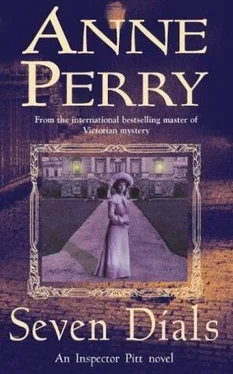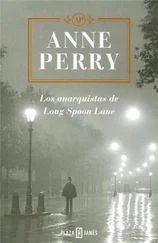Narraway breathed in and out very slowly. “What are you saying, Pitt? There is no time for games.”
If he did not say it now then the moment would be past, and he would live with the doubt forever.
“Convenient for us,” he answered. “In fact, it has probably saved Suez.” He held Narraway’s gaze without blinking.
Narraway was very pale. “Probably,” he agreed. Again there was the shadow across his face.
“Why would el Abd do that?” Pitt asked.
“I don’t know. It makes no sense,” Narraway admitted, still standing motionless in the middle of the floor.
“If I had…” Pitt said. “Or you…”
At last Narraway understood. The last vestige of blood drained from his face, leaving his skin like gray paper. “God Almighty! You think I killed el Abd!”
“Did you?”
“No,” Narraway said quickly. “No, I didn’t.” He did not ask if Pitt had; he already knew the answer. He also knew that Pitt’s question was genuine, and that it hurt him to ask. It was the doubt twisting inside him that drove him to speak. “Was he murdered?”
“Are you certain he was murdered?”
“Not beyond doubt. But I believe he was,” Pitt replied. “It was done well, with great skill. Impossible to tell if the injuries were just before death or just after… a deliberate blow or accidental as he fell, or even from a passing ship. We’ll prove nothing.”
The shadow was there in Narraway’s face again. “Who would kill him, and why?”
“Someone who knew of the massacre,” Pitt replied. “And who would do anything, even commit murder and allow Ryerson to hang for it, rather than see the truth exposed, and face what it will cost.”
Narraway was truly astounded. “Is that what you think?” he said, his voice cracking with incredulity. “That I want Ryerson to hang?”
“No, I don’t think you do,” Pitt said honestly. “I think you hate it. I think the guilt tortures you, but you’ll let him hang rather than expose the massacre and lose Egypt.”
Narraway did not reply. The silence hung in the air like a gulf of darkness between them.
“Don’t use my few minutes left for this,” Pitt said, not moving from his position blocking the doorway. He did not intend a physical threat; in fact, he was not even sure if he could provide one. Narraway was lighter and shorter, but he was lean and possibly he was trained in ways that Pitt had not even thought of. He might even be armed.
Nevertheless, Pitt did not intend to move until he received an answer. It was emotion that held him, not reason. He had not thought what he would do if Narraway had confessed to having killed el Abd.
The clouds cleared and for a moment sunlight dappled the floor.
“It has nothing to do with Egypt, or Lovat’s murder, or the massacre,” Narraway said at last, his voice low and a little husky.
Pitt waited.
“Damn it, Pitt! It’s none of your business!” Narraway exploded. “It happened years ago… I… I just…” He stopped again.
Pitt did not move.
“Twenty years ago,” Narraway began again, “I was working on the Irish Problem. I knew there was an uprising planned-violence, assassinations…”
Pitt was suddenly cold.
“I needed to know what was going on,” Narraway said, his eyes unflinching but hot with misery. “I had an affair with Ryerson’s wife.” His voice shook. “It was my fault she was shot.”
So it was guilt, just not for Lovat or Ayesha or anything that was happening now. Without even thinking about it, Pitt realized that he believed him.
Narraway waited, still watching Pitt’s face. He would not ask.
Very slowly Pitt nodded. He understood. More than that, he realized with amazement something that would probably never be said, never even be referred to again-Narraway cared what he thought.
“Are we going to court?” Narraway snapped. He had seen the belief in Pitt’s face, and it was enough. Now the agony of tension was gone and he wanted the moment broken. He had a debt to pay and he was burning to be about it.
“Yes,” Pitt agreed, turning back to the door and leading the way out again without looking to see Narraway following.
THE OLD BAILEY COURTROOM was less than full. These last few days were something of an anticlimax. The newspapers had reported the death of Tariq el Abd, but only as an unknown foreigner who had apparently committed suicide. No connection was made with the Ryerson case, the verdict of which was now taken for granted, although it was not expected until tomorrow. The defense counsel was obliged to make some attempt at explanation, reasonable doubt, anything to appear to have done his best.
Narraway and Pitt entered the courtroom just as Sir Anthony Markham, counsel for the defense, was rising to his feet to begin.
The judge looked at Narraway with annoyance at the interruption. He had no idea who he was, simply someone with the ill manners to arrive late, and conspicuously.
Pitt hesitated. Markham obviously knew Narraway, but there was no interest in his face, rather the opposite. He shook his head very slightly and turned back to the judge.
Narraway stopped. Did Markham know about el Abd or not? Surely if he did not, he would be desperate for any defense at all. Then he realized with dismay that he was not certain whether el Abd had been a prosecution witness, to seal the case absolutely with a perfect motive, or a defense witness, to offer some mitigation for the crime?
Or was the surprise witness not el Abd, but someone else? It came back to the same question, to which they still had no answer at all-who was the prime mover behind Lovat’s murder, the man who wished to bring down Suez and the eastern half of the empire? And was one of the two lawyers here in his pay?
Who had murdered el Abd, and why?
The courtroom was motionless. Pitt looked around. The public gallery was about three-quarters full. He saw Vespasia, the light on her pale face and catching the silver of her hair. She was wearing a very small, discreet hat today, possibly in consideration for those whose view she might block. In the row behind her was Ferdinand Garrick, his face rigid, eyes forward in a wide, fixed stare, almost as if he were mesmerized by what was about to play itself out on the courtroom floor below him.
The jury sat waiting, sad and no longer really interested. They listened and watched because it was their duty.
Narraway continued towards Markham and stopped at his side, Pitt a step behind him.
“The body under the bridge was Tariq el Abd,” Narraway said in so low a voice that Pitt caught only every other word. “It was he who killed Lovat. Miss Zakhari admitted it, and it makes perfect sense of the evidence.”
Markham stood motionless. “How convenient for Miss Zakhari… and of course for Mr. Ryerson,” he replied with a glint of sarcasm. “Why did this Egyptian manservant kill Lieutenant Lovat? Do you know that as well?”
“No, I don’t, and it doesn’t matter.” Narraway’s voice was cold. “Perhaps Lovat misused his daughter, or his sister, or even his wife, for all I know. Just get on with it! Call the river police. Then Pitt will identify the dead man for you.”
Markham glanced at Pitt.
Pitt nodded.
Markham’s face was set hard. He disliked being told what to do, by anyone.
“Do you intend to proceed, Sir Anthony?” the judge enquired with a touch of irritation.
Markham looked up, as if already dismissing Narraway.
“Yes, my lord. I have just learned of some very remarkable events which shed a totally different light on Lieutenant Lovat’s death. With your permission, I would like to call Thomas Pitt to the stand.”
“This had better be relevant, Sir Anthony,” the judge said warily. “I will not have theatrics in my court.”
Читать дальше












